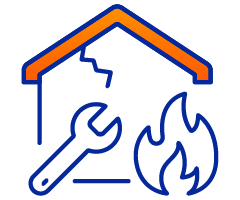Start Here
Homepage Bottom Form
We will get back to you as soon as possible.
Please try again later.
Fire Restoration Contract Checklist
🧱 Things Every Homeowner Should Know Before Signing a Fire Restoration Contract
Created by House Fire Solutions — Trusted Guidance for Fire Recovery & Rebuilding
When you’ve just experienced a house fire, it’s easy to feel pressured into signing with the first company that offers help. Unfortunately, many homeowners are taken advantage of at their most vulnerable moment — signing contracts that lead to financial loss, poor workmanship, or even legal disputes.
This checklist will help you slow down, ask the right questions, and sign only when you fully understand what you’re agreeing to.
🔹 1. Verify the Contractor’s Credentials
☐ Check that the company is
licensed in your state (verify online with your state licensing board).
☐ Request a
copy of their general liability and workers’ compensation insurance.
☐ Verify that insurance coverage is current and active.
☐ Ask for a
contractor’s license number and confirm it matches their company name.
☐ Look up the business on
Better Business Bureau (BBB) and
Google Reviews for complaints.
☐ Confirm the contractor has
fire restoration experience, not just general construction.
☐ Ask for at least
3 local references from homeowners who’ve had similar fire recovery work done.
☐ Verify if they’re members of
professional organizations (like IICRC or RIA).
💡 Tip: Never work with a contractor who refuses to provide documentation — it’s a major red flag.
🔹 2. Confirm Who You’re Actually Hiring
☐ Check if the person you’re speaking with is
a company representative or an independent “storm chaser.”
☐ Ask if any
subcontractors will be involved and get their credentials in writing.
☐ Require the
legal business name on all paperwork — not just the brand name on their truck.
☐ Confirm that
permits and inspections will be handled by the contractor, not left to you.
☐ Make sure the contract states clearly
who is responsible for cleanup and disposal.
☐ Ask for
proof of local business registration or tax ID number.
💡 Tip: Many out-of-town contractors swoop into disaster areas and disappear when issues arise — always verify local ties.
🔹 3. Understand the Scope of Work
☐ Ask for a
detailed written estimate that breaks down materials, labor, permits, and disposal.
☐ Make sure the
scope of work matches the insurance estimate provided by your adjuster.
☐ Confirm
which repairs are covered by insurance and which are out-of-pocket.
☐ Request
clarity on “allowances” for materials (e.g., flooring, cabinets, paint).
☐ Ensure the contract specifies
start and completion dates — and penalties for delays.
☐ Make sure
change orders must be signed and approved by you before additional work is done.
☐ Ask for an outline of
what will be restored vs. replaced.
☐ Confirm
debris removal and site cleanup are included in the price.
💡 Tip: The more detail in the scope, the fewer “surprise charges” later.
🔹 4. Understand Payment Terms
☐ Never pay in full upfront — limit deposits to
no more than 10–20% of the total project cost.
☐ Confirm payment schedules are tied to
completed milestones, not arbitrary dates.
☐ Never pay cash — use check, credit card, or bank transfer for proof of payment.
☐ Make sure the contract specifies
who gets paid directly from insurance funds (you or the contractor).
☐ Avoid signing
Assignment of Benefits (AOB) documents unless fully explained by your insurance company.
☐ Require a
final lien waiver from the contractor after final payment.
☐ Keep all receipts and proof of payment for insurance reimbursement.
💡 Tip: A legitimate contractor won’t pressure you for large upfront payments — especially before work begins.
🔹 5. Read the Fine Print
☐ Review all contract pages — including the back — before signing.
☐ Watch for
“authorization to proceed” or
“AOB” clauses hidden in small print.
☐ Ensure the contract clearly lists
what’s excluded from the project.
☐ Check for
warranty terms — how long, what’s covered, and who to contact for repairs.
☐ Verify any
cancellation or refund policy before work starts.
☐ Ensure
permit fees, taxes, and disposal fees are clearly stated.
☐ Ask about
liability for theft or property damage during the project.
☐ Avoid vague terms like “as needed” or “to be determined.”
💡 Tip: Have a trusted advisor or public adjuster review the contract before you sign.
🔹 6. Protect Your Legal Rights
☐ Ensure your name (not the contractor’s) remains on the
insurance payout checks.
☐ Verify that you will receive
copies of all permits and inspection approvals.
☐ Require that any disputes go through
local small claims or arbitration, not out-of-state courts.
☐ Check that all warranties are
transferable and in writing.
☐ Make sure the contract includes a
completion certificate for final sign-off.
☐ Ask for a
final inspection walkthrough before the last payment.
☐ Keep digital copies of every contract, invoice, and permit.
💡 Tip: Never sign a “power of attorney” or give full claim control to the contractor.
🔹 7. Red Flags to Watch For
☐ Contractor pressures you to sign on the spot.
☐ They say they can “handle your insurance claim for you.”
☐ Offer seems too good to be true — or far lower than other bids.
☐ They refuse to put details in writing.
☐ No physical office address or verifiable references.
☐ Request for full payment upfront.
☐ License or insurance information “pending.”
☐ Poor online reviews or multiple complaints.
💡 Tip: Trust your instincts — hesitation is a valid reason to pause and verify.
🔹 8. Smart Next Steps Before Signing
☐ Compare at least
3 written bids from licensed restoration companies.
☐ Review bids with your
insurance adjuster or public adjuster for alignment.
☐ Take time to read each contract fully — never rush.
☐ Document your conversations via email or notes.
☐ Request a
project manager contact for direct communication.
☐ Keep copies of all signed paperwork in your Fire Recovery Binder.
☐ Schedule weekly updates once work begins.
💡 Tip: Transparency, documentation, and patience are your best protection.
🔹 9. Post-Signing Checklist
☐ Confirm contractor has
filed required permits before starting work.
☐ Save all
material samples, color codes, and serial numbers.
☐ Take “before” photos of your property before work starts.
☐ Inspect work daily or weekly as progress is made.
☐ Report issues to the contractor in writing immediately.
☐ Keep all
inspection reports and approval certificates.
☐ Retain a
final copy of the signed completion form for your insurance claim.
💡 Tip: Stay engaged — it’s your home and your investment.
🔹 10. Final Homeowner Takeaways
✅ You are never required to sign with the first contractor who calls.
✅ Take your time —
you legally have the right to review contracts before signing.
✅ Always prioritize
licensed, insured, and transparent professionals.
✅ Documentation is your best defense — and your strongest recovery tool.
✅ When in doubt, call House Fire Solutions — we can connect you with vetted professionals and guide you through the process.
Our Team Helps You Navigate Insurance, Restoration, and Rebuilding
It is a long established fact that a reader will be distracted by the readable content of a page when looking at its layout.

Board-Up
Our Network of Board Up Specialist Will Secure your property fast

Temp Housing
We'll Help You Find Safe Shelter while you recover

Public Adjusters
Our Network of Fire Damage Adjusters Will Fight Help for a fair insurance payout

Investors
Our Partner Specializes in Buying Fire Damaged Homes So you Can Sell your home as-is

Content Cleaning
Restore what matters most

Restoration
Bring your home back to life

Attorneys
We have a network of Protect your rights and claims

Mental Health
Support for you and your family
Want To See If We Can Help You
If you'd like to speak with us today about purchasing Social Security, Personal Injury, Workers' Compensation or Employment Law Leads.
Homepage Bottom Form
We will get back to you as soon as possible.
Please try again later.